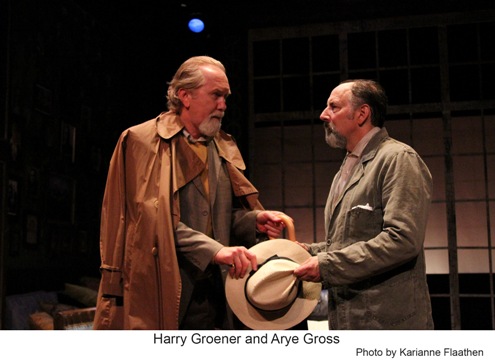“Look, in one hundred, two hundred years, there will be people who look back and laugh at us, because we lived our lives so foolishly and tastelessly. Maybe those people will have found a way to be happy.” This line from Anton Chekov’s classic play, Uncle Vanya, keenly invites audiences to be introspective: to compare themselves with those of the past; to find the parallels; and to fully realize why even the differences that separate us can easily be identified with or understood. It is this sense of perspective that permeates Annie Baker’s translation of Uncle Vanya, which recently launched its West Coast premiere with The Antaeus Theatre Company in North Hollywood, CA. In a masterful production that flawlessly unites Baker’s vital rendition of the work with an impeccable and passionate cast, Antaeus’ Uncle Vanya imparts audiences with an opportunity to examine their lives, if only to provide a comfort (no matter how melancholy) that we are not so different from our ancestors, nor from each other in today’s chaotic and fast-paced world.
Directed by Robin Larsen, Uncle Vanya marks the final production of Antaeus’ 2015 season. The play focuses on the inhabitants of a rural Russian estate, including the titular Uncle Vanya and his niece Sonya, whose monotonous, yet grueling, lives are upended by the arrival of Vanya’s aging brother-in-law, Professor Serebryakov, and Serebryakov’s much-younger and beautiful second wife Yelena. No longer able to afford the luxuries of urban living, Serebryakov and Yelena decide to take residence at the estate of his first wife (Vanya’s deceased sister), oblivious to the effects that this move has on its tenants, whose tireless efforts have made the Professor’s city living possible.

While, at first glance, the Professor and his young wife’s motives may seem dubious and pompous, by peeling back the layers of these complex characters, it is revealed that their feelings of dissatisfaction with life are not so far off from those of Vanya, Sonya, and the others at the estate. By weaving in and out of the daily lives of these characters, the audience fully grasps the universal lack of fulfillment and seemingly hopeless futures possessed by Chekov’s characters, whether caused by unrequited love, old age, economic class, or other immutable circumstances. While some characters may have a more articulate grasp on the specific inequities of life that plague their hearts and minds, the ability to alter those circumstances in search of a more fulfilled life seems impossible for all. Like a Shakespearean tragedy, the parallels of pain and suffering that could otherwise unite the characters through empathy only seek to divide them.
In bringing these timeless characters to life, Antaeus’ ensemble cast is flawless and captivating. As a whole, the entire ensemble works like a well-oiled machine, each actor providing a rich and full setting within which their fellow players may flourish. This creative safe space must be at least partly attributed to Antaeus’ practice of “partner casting,” where two actors share every role, allowing a more active and encompassing creative process by which the actors may rehearse, develop, and experience their performance from varying perspectives (which seems apropos for this play of parallels). I had the pleasure of seeing a performance with Arye Gross as Uncle Vanya, Harry Groener as the Professor, Rebecca Mozo as Yelena, Shannon Lee Clair as Sonya, and Andrew Borba as Dr. Astrov (the town doctor who is the object of Sonya’s affections), and their performances were nothing short of exceptional. The actors clearly had a masterful grasp of the text and breathed truthful and exuberant life into their roles. I would be remiss if it did not note that Gross, who has possessed a remarkable career on both stage and screen, was truly awe-inspiring as Vanya. His passion and heartbreak were equally vibrant, and his command of the character is unmatched. Likewise, Clair’s Sonya embodied the vitality and hope of youth that was burdened by a life of hardship and limited opportunities. Her performance opposite Gross was truly remarkable. These two powerhouse performers, whose agony is universally identifiable, are truly to be commended.

To say that Antaeus’ production of Uncle Vanya was one of the most impactful and phenomenal evenings of theatre that I have ever witnessed would still be short of the high praise that it deserves. For those in the SoCal area, I implore you to see Antaeus’ production before its close, as it will undoubtedly resonate with today’s audiences and is, in my humble opinion, a necessity to see.
Uncle Vanya will play at the Antaeus Theatre in North Hollywood through December 6, with performances on Thursdays and Fridays at 8 p.m., Saturdays at 2 p.m. and 8 p.m., and Sundays at 2 p.m. (Please note that there will not be a matinee performance on Saturday, October 17.) Tickets are $30 on Thursdays and Fridays (except October 15 and 16 which are $34 and include a post-performance reception), and $34 on Saturdays and Sundays.

